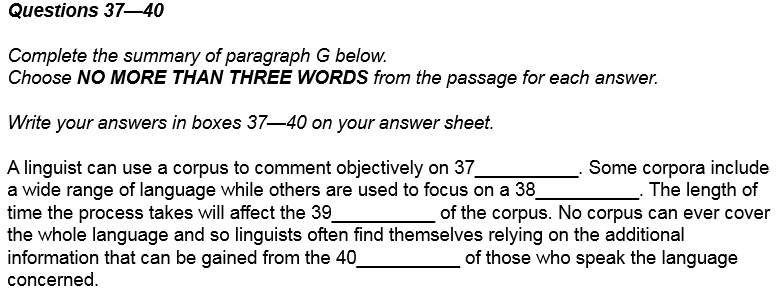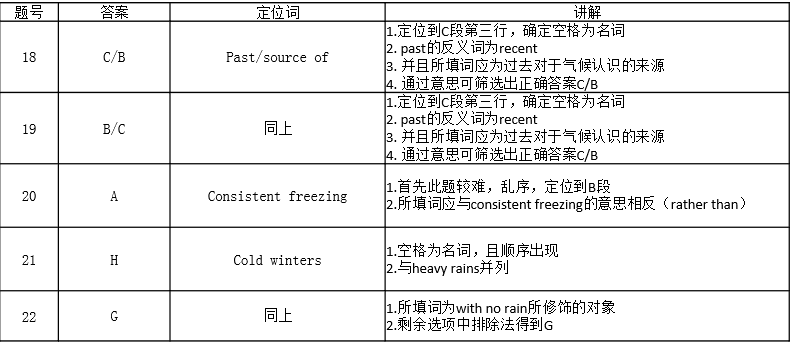一起来看看GRE阅读思路的归纳吧?今天小编给大家带来了 GRE阅读思路的归纳,希望能够帮助到大家,下面小编就和大家分享,来欣赏一下吧。
GRE阅读思路的归纳
新GRE阅读思路分析,主要要说说GRE阅读逻辑题,对于GRE阅读有一种题型,诸如说“下列哪项可以支持原文观点?”相信同学们的第一反应就是找原文的结论,再看哪个选项支持结论。其实这样的题目未必是要这么做,下面为大家进行GRE阅读思路讲解,帮助大家应对新GRE阅读逻辑难题。
上述问题利用找原文这个思维就太狭隘了,因为支持条件、结论和推理过程都是对原文观点的支持,这点思维大家要建立起来。用一个例子给大家分析巩固下这个思维,具体题目和文章就不引述了,考生可以看看N0.6第二套section 1的长文章,讲的浮游植物和浮游动物之间关系。
文中有这样一个推理,由“出现了高密度浮游植物的地区,浮游动物就少”推出了“浮游植物分泌排斥剂,把动物赶跑了”,后面有题问到如何削弱(weaken)此结论,我们直接看看正确答案(B)“动物排斥和植物种群密度是无关的”。言下之意就是把推理过程推翻了,条件是推不出结论的。我们来看看,如何推翻条件,“在某些地区,出现了高密度浮游植物,但浮游动物并没有减少”。
这就削弱了条件。再看看如何削弱结论,“试验中,将植物体内的排斥物质放在正在培养着浮游动物的容器中,并不能使浮游动物的数量减少”结论就削弱了。
所以考生们在做完一个gre阅读逻辑题以后,不要满足于答案,要多想想到底是支持或削弱了条件,结论还是推理过程。当把这种思维变成自己思维一部分的时候,自然可以应对自如。
GRE阅读真题:草原上的大型哺乳动物
SECTION A
The evolution of intelligence among early large mammals of the grasslands was due in great measure to the interaction between two ecologically synchronized groups of these animals, the hunting carnivores and the herbivores that they hunted. The interaction resulting from the differences between predator and prey led to a general improvement in brain functions; however, certain components of intelligence were improved far more than others.
The kind of intelligence favored by the interplay of increasingly smarter catchers and increasingly keener escapers is defined by attention—that aspect of mind carrying consciousness forward from one moment to the next. It ranges from a passive, free-floating awareness to a highly focused, active fixation. The range through these states is mediated by the arousal system, a network of tracts converging from sensory systems to integrating centers in the brain stem. From the more relaxed to the more vigorous levels, sensitivity to novelty is increased. The organism is more awake, more vigilant; this increased vigilance results in the apprehension of ever more subtle signals as the organism becomes more sensitive to its surroundings. The processes of arousal and concentration give attention its direction. Arousal is at first general, with a flooding of impulses in the brain stem; then gradually the activation is channeled. Thus begins concentration, the holding of consistent images. One meaning of intelligence is the way in which these images and other alertly searched information are used in the context of previous experience. Consciousness links past attention to the present and permits the integration of details with perceived ends and purposes.
The elements of intelligence and consciousness come together marvelously to produce different styles in predator and prey. Herbivores and carnivores develop different kinds of attention related to escaping or chasing. Although in both kinds of animal, arousal stimulates the production of adrenaline and norepinephrine by the adrenal glands, the effect in herbivores is primarily fear, whereas in carnivores the effect is primarily aggression. For both, arousal attunes the animal to what is ahead. Perhaps it does not experience forethought as we know it, but the animal does experience something like it. The predator is searchingly aggressive, innerdirected, tuned by the nervous system and the adrenal hormones, but aware in a sense closer to human consciousness than, say, a hungry lizard’s instinctive snap at a passing beetle. Using past events as a framework, the large mammal predator is working out a relationship between movement and food, sensitive to possibilities in cold trails and distant sounds—and yesterday’s unforgotten lessons. The herbivore prey is of a different mind. Its mood of wariness rather than searching and its attitude of general expectancy instead of anticipating are silk-thin veils of tranquility over an explosive endocrine system.
17. The author is primarily concerned with
(A) disproving the view that herbivores are less intelligent than carnivores
(B) describing a relationship between animals’ intelligence and their ecological roles
(C) establishing a direct link between early large mammals and their modern counterparts
(D) analyzing the ecological basis for the dominance of some carnivores over other carnivores(B)
(E) demonstrating the importance of hormones in mental activity
18. The author refers to a hungry lizard (line 55) primarily in order to
(A) demonstrate the similarity between the hunting methods of mammals and those of nonmammals
(B) broaden the application of his argument by including an insectivore as an example
(C) make a distinction between higher and lower levels of consciousness
(D) provide an additional illustration of the brutality characteristic of predators(C)
(E) offer an objection to suggestions that all animals lack consciousness
19. It can be inferred from the passage that in animals less intelligent than the mammals discussed in the passage
(A) past experience is less helpful in ensuring survival
(B) attention is more highly focused
(C) muscular coordination is less highly developed
(D) there is less need for competition among species(A)
(E) environment is more important in establishing the proper ratio of prey to predator
20. The sensitivity described in lines 56-61 is most clearly an example of
(A) “free-floating awareness” (lines 16-17)
(B) “flooding of impulses in the brain stem” (lines 29-30)
(C) “the holding of consistent images” (lines 31-32)
(D) “integration of details with perceived ends and purposes” (lines 37-38)(D)
(E) “silk-thin veils of tranquility” (line 64)
21. The author’s attitude toward the mammals discussed in the passage is best described as
(A) superior and condescending
(B) lighthearted and jocular
(C) apologetic and conciliatory
(D) wistful and tender(E)
(E) respectful and admiring
22. The author provides information that would answer which of the following questions?
I. Why is an aroused herbivore usually fearful?
II. What are some of the degrees of attention in large mammals?
III. What occurs when the stimulus that causes arousal of a mammal is removed?
(A) I only
(B) III only
(C) I and II only
(D) II and III only(C)
(E) I, II and III
23. According to the passage, improvement in brain function among early large mammals resulted primarily from which of the following?
(A) Interplay of predator and prey
(B) Persistence of free-floating awareness in animals of the grasslands
(C) Gradual dominance of warm-blooded mammals over cold-blooded reptiles
(D) Interaction of early large mammals with less intelligent species(A)
(E) Improvement of the capacity for memory among herbivores and carnivores
24. According to the passage, as the process of arousal in an organism continues, all of the following may occur EXCEPT:
(A) the production of adrenaline
(B) the production of norepinephrine
(C) a heightening of sensitivity to stimuli
(D) an increase in selectivity with respect to stimuli(E)
(E) an expansion of the range of states mediated by the brain stem
Tocqueville, apparently, was wrong. Jacksonian America was not a fluid, egalitarian society where individual wealth and poverty were ephemeral conditions. At least so argues E. Pessen in his iconoclastic study of the very rich in the United States between 1825 and 1850.
Pessen does present a quantity of (a quantity of: 一些) examples, together with some refreshingly intelligible statistics, to establish the existence of an inordinately wealthy class. Though active in commerce or the professions, most of the wealthy were not self-made, but had inherited family fortunes. In no sense mercurial, these great fortunes survived the financial panics that destroyed lesser ones. Indeed, in several cities the wealthiest one percent constantly increased its share until by 1850 it owned half of the community’s wealth. Although these observations are true, Pessen overestimates their importance by concluding from them that the undoubted progress toward inequality in the late eighteenth century continued in the Jacksonian period and that the United States was a class-ridden, plutocratic society even before industrialization.
25. According to the passage, Pessen indicates that all of the following were true of the very wealthy in the United States between 1825 and 1850 EXCEPT:
(A) They formed a distinct upper class.
(B) Many of them were able to increase their holdings.
(C) Some of them worked as professionals or in business.
(D) Most of them accumulated their own fortunes.(D)
(E) Many of them retained their wealth in spite of financial upheavals.
26. The author’s attitude toward Pessen’s presentation of statistics can be best described as
(A) disapproving
(B) shocked
(C) suspicious
(D) amused(E)
(E) laudatory
27. Which of the following best states the author’s main point?
(A) Pessen’s study has overturned the previously established view of the social and economic structure of early nineteenth-century America.
(B) Tocqueville’s analysis of the United States in the Jacksonian era remains the definitive account of this period.
(C) Pessen’s study is valuable primarily because it shows the continuity of the social system in the United States throughout the nineteenth century.
(D) The social patterns and political power of the extremely wealthy in the United States between 1825 and 1850 are well documented.(E)
(E) Pessen challenges a view of the social and economic system in the United States from 1825 to 1850, but he draws conclusions that are incorrect.
GRE阅读思路的归纳相关文章:
★ 做题总结举例
★ GRE阅读高频题型训练注意事项
★ GRE阅读6种常见错误选项形式类型讲解
★ 手把手教你攻克GRE长阅读
★ GRE阅读文章取材的特点是什么
★ 英语单词
GRE阅读思路的归纳
上一篇:2020GRE阅读的全面了解
下一篇:GRE阅读如何培养习惯






